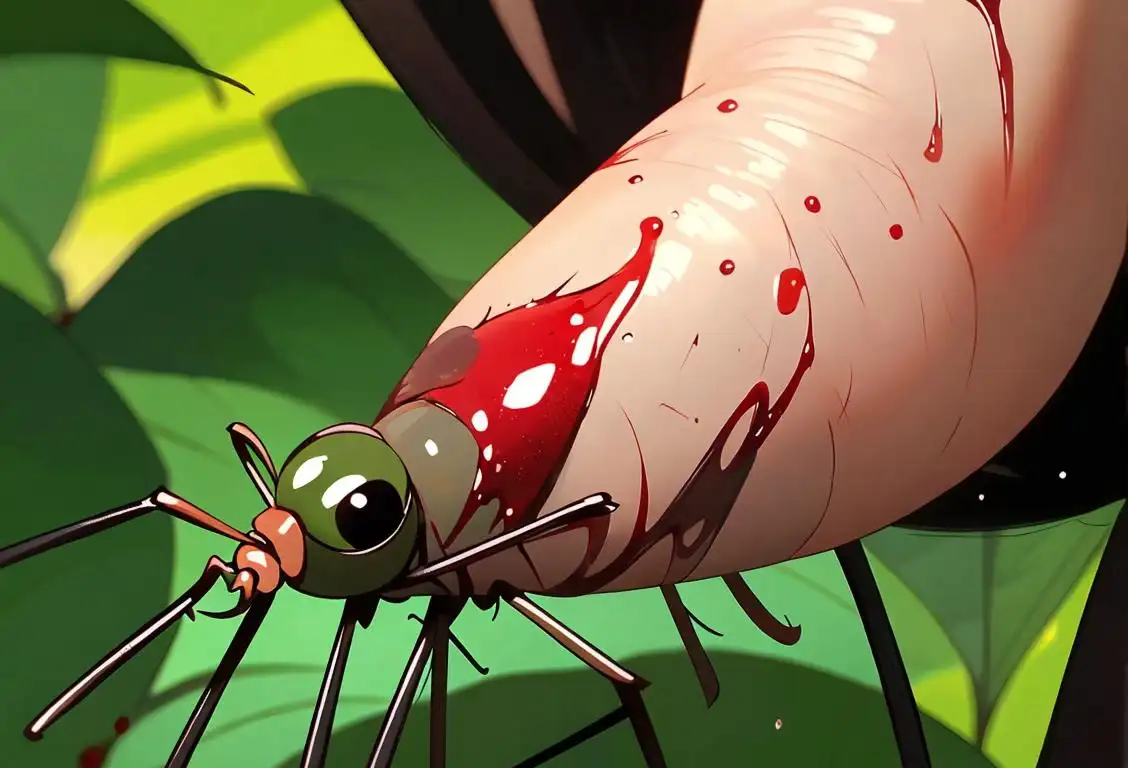National Mosquito Day

Ah, National Mosquito Day! Gather 'round, my friends, as we delve into the fascinating and blood-sucking world of these tiny, yet mighty, insects.
When is Mosquito Day?
It's national mosquito day on the 20th August.
The Buzz About National Mosquito Day
Every year on August 20th, we come together to honor the peskiest critters of the insect world: mosquitoes. These minuscule vampires have been buzzing around for millions of years, making our summers itchier and our backyard barbecues a little less enjoyable.
But believe it or not, there's more to mosquitoes than just their incessant need for a quick snack. National Mosquito Day actually has a historical significance that dates back to the late 1800s.
The Internet History of National Mosquito Day
Back in 1897, a British scientist named Sir Ronald Ross made a groundbreaking discovery. He proved that female mosquitoes were the culprits behind the transmission of malaria, a disease responsible for claiming millions of lives.
This pivotal moment in medical history deserved recognition, and so, National Mosquito Day was born. It serves as a reminder of the ongoing fight against mosquito-borne diseases and the importance of mosquito control.
Did You Know?
Here's a fun (yet itchy) fact for you: Did you know that mosquitoes are attracted to certain scents? Yep, it's true! Studies have shown that they are particularly fond of the smell of sweat, lactic acid, and carbon dioxide. So next time you're out enjoying a hike or a picnic, make sure to bring some bug spray and an extra can of deodorant!
History behind the term 'Mosquito'
1599
First documented use as 'mosquito'
The term 'mosquito' was first documented in 1599 in the English language. It is derived from the Spanish word 'mosca', which means 'fly'. The diminutive form 'mosquito' was used to refer to small flies, including those pesky blood-sucking insects we know today.
1822
Recognizing the distinct species
In 1822, Sir Patrick Manson, a Scottish physician, established the connection between mosquitoes and the spread of diseases like malaria. His research led to the discovery that female mosquitoes transmit pathogens when they bite humans. This realization marked a significant milestone in understanding the role mosquitoes play in disease transmission.
1897
The discovery of Anopheles mosquitoes
In 1897, British surgeon Ronald Ross made a groundbreaking discovery. He identified that Anopheles mosquitoes were the primary vectors of malaria, a disease that affects millions of people worldwide. Ross's findings revolutionized the field of tropical medicine and enabled targeted control measures to combat the spread of malaria.
1901
Nobel Prize awarded for malaria research
In 1901, Ronald Ross was awarded the Nobel Prize in Physiology or Medicine for his discoveries regarding the transmission of malaria. His work created a foundation for understanding many other mosquito-borne diseases and laid the groundwork for future advancements in vector control and prevention strategies.
1946
Invention of the first commercial mosquito repellent
In 1946, the first commercially available mosquito repellent, known as 'DEET' (N,N-Diethyl-meta-toluamide), was developed by the United States Department of Agriculture. DEET became an essential tool in protecting humans from mosquito bites, reducing the risk of disease transmission and discomfort caused by mosquito infestations.
1961
Expansion of mosquito control programs
In 1961, the World Health Organization (WHO) initiated a global campaign called the Global Malaria Eradication Program. This program aimed to control and eliminate malaria by implementing various mosquito control strategies, such as the use of insecticides, bed nets, and environmental modifications. Although the complete eradication of malaria has remained elusive, these efforts significantly reduced the global burden of the disease.
2000s
Emergence of genetically modified mosquitoes
In the 2000s, scientists began exploring new approaches to combat mosquito-borne diseases. One innovative method involved genetically modifying mosquitoes to reduce their ability to transmit diseases. For example, researchers developed genetically modified mosquitoes with altered genes that prevent the transmission of dengue fever. These advancements offer promising solutions for reducing the impact of mosquito-borne illnesses in the future.
Did you know?
Did you know that mosquitoes are attracted to certain scents like sweat, lactic acid, and carbon dioxide?Tagged
awareness funFirst identified
20th August 2017Most mentioned on
20th August 2018Total mentions
44Other days
Nurses Day
Former Prisoner Of War Recognition Day
Press Day
Handloom Day
Heroes Day
Memorial Day
Dance Day
Bestfriends Day
Liberation Day
Love Your Pet Day









